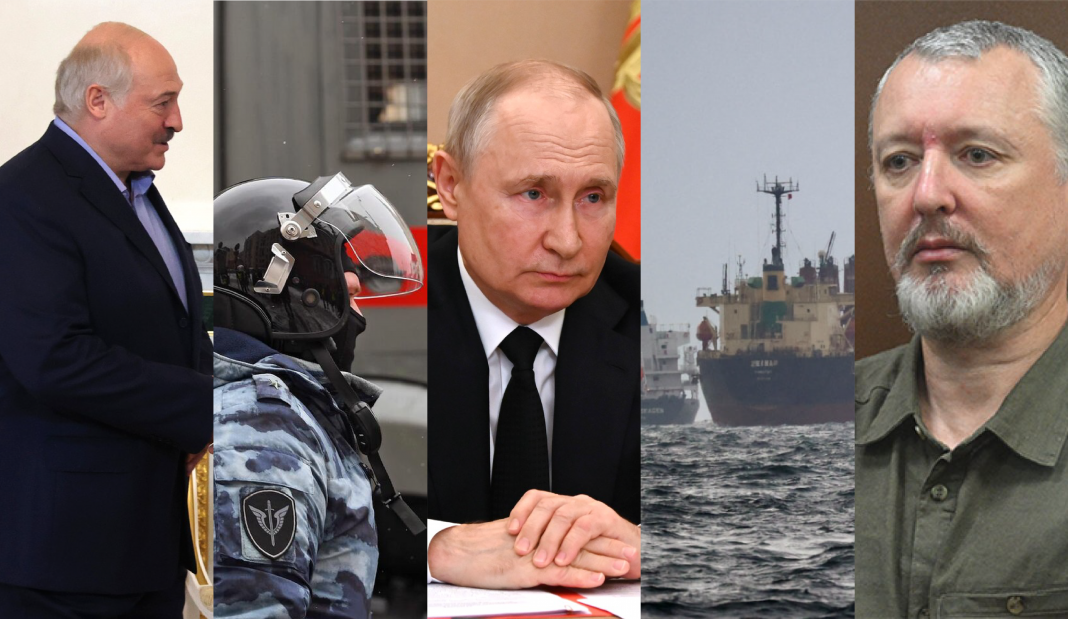This report describes the key events that significantly impacted Russia’s political, economic and social processes.
Based on the results of the past week, the following trends can be summarised:
- The role of the National Guard is significantly increasing in Russia, copying the regular army’s functions and increasingly creating competition for the Ministry of Defense. Since 2016, the Russian Guard has ceased to be a type of internal troops of the Ministry of Internal Affairs of Russia and has actually turned into a separate military unit, which is personally subordinate to the President of the Russian Federation. Also, against the background of the adoption of other legislative changes that strengthen the FSB, FSO and the Russian Guard, it can be assumed that Russia continues to prepare for an escalation and a possible direct conflict with NATO.
- Russia is becoming increasingly involved in internal Polish political games. Oddly enough, it is beneficial for Russia to keep the Law and Justice Party (PIS) in power, despite its openly anti-Russian rhetoric. Staying PIS in power is not only a conflict with Russia (this is precisely Russia’s least concern). PIS continues and deepens Poland’s conflict with Old Europe, especially Germany.
- On the eve of the next Russia-Africa summit, Moscow is trying in every possible way to demonstrate the strengthening of its position on this continent. In the process of the “Global South” crystallisation, Russia’s activity on the African continent is understandable. However, the interests of several other players will inevitably clash here – especially China and France. At the same time, Russia will be sent to territories that remain under the control of France or the United States. This, from Beijing’s point of view, is quite profitable. That is why soon, it will be possible to transfer a large number of “Wagnerites” and representatives of other PMCs to Africa – to promote the political interests of Russia.
This report describes the topics being the most relevant for Russia during 17-23 July:
1. Transfer of heavy weapons to the National Guard;
2. Putin’s meeting with permanent members of the Security Council;
3. Alexander Lukashenko’s visit to Russia;
4. Death of Anton Cherepennikov;
5. Termination of the Black Sea Grain Initiative;
6. Detention of Igor Girkin-Strelkov and Pavel Gubarev;
7. Muslim protest in Moscow;
8. Transfer of Danone facilities to Ramzan Kadyrov’s group;
9. Vladimir Putin’s article about Africa
This Content Is Only For Subscribers
- Transfer of heavy weapons to the National Guard
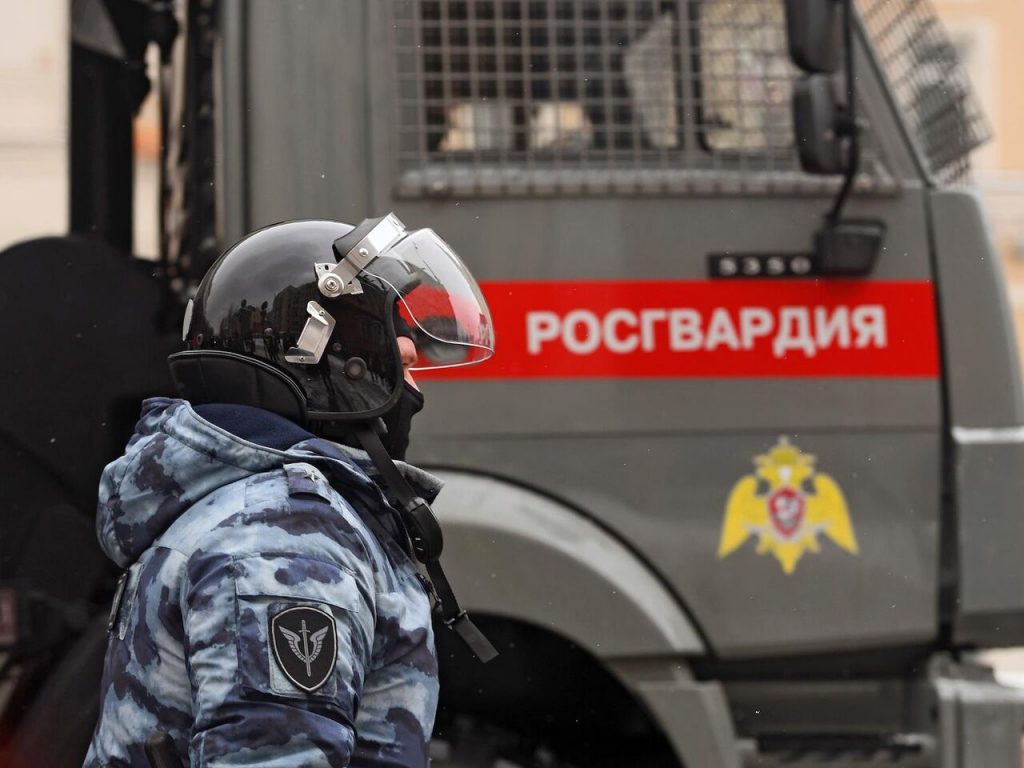
On Wednesday, July 19, the State Duma of Russia adopted amendments to federal law No. 226 of July 3, 2016, “On the National Guard Troops of the Russian Federation”, in three readings. These amendments empower the National Guard with the right to own military equipment, including heavy equipment. Also, the new amendments enable the National Guard to use such equipment to protect citizens, officials and military personnel, ensure security during riots and emergencies and suppress the activities of illegal armed groups. The explanatory note to the draft law expresses that heavy equipment is needed by the National Guard in connection with the fulfilment of the tasks assigned to them, such as “participation in the fight against terrorism and extremism, participation in ensuring the state of emergency, martial law, the legal regime of the counter-terrorist operation, participation in territorial defence, and so on.”
Outcomes and outlook:
The strengthening of the National Guard and Viktor Zolotov personally must be considered in several planes simultaneously. First, by such a decision, Putin displays his confidence in Zolotov and entrusts him with the role of equaliser in the face of the strengthening positions of Shoigu-Gerasimov. Given the pathological fear of the Russian president of the possibility of a military coup in the face of protracted hostilities and the increasingly active militarisation of society, Putin is betting on Zolotov, strengthening his position in the military environment. At the same time, the stakes on the National Guard itself are also significantly increasing, duplicating the regular army’s functions and increasingly confidently creating competition with the Ministry of Defense. Since 2016, the National Guard has ceased to be a type of internal troops of the Ministry of Internal Affairs of Russia and has actually turned into a separate military unit, which is personally subordinate to the President of the Russian Federation.
Secondly, the promptness in the issue of making a decision on the provision of military equipment to the National Guard attracts attention. Public discussions about the possibility of strengthening the National Guard in this way began immediately after the “Prigozhin’s Riot”, which was perceived by many as an attempted military coup. The draft law was submitted to the State Duma on July 17, and on July 19, all the necessary amendments were voted in three readings. It is expected that on July 28, it should be approved by the Federation Council and signed by Putin by the end of the month, after which the amendments will enter into full legal force.
Thirdly, along with the amendments to the law on the National Guard, changes were made to the law on state secrets, strengthening the requirements for its protection. In fact, such changes expand the powers of the FSB. According to the new changes, they grant new powers to the president, in connection with which he can change the procedure for access to state secrets during periods of mobilisation and martial law. Also, additional restrictions are being introduced on travel outside Russia for persons with appropriate access to state secrets.
In this case, Ascolta assumes that in early August, serious changes may occur in the Russian military leadership. They will entail several changes in both domestic and foreign political processes. Also, against the background of the adoption of other legislative changes that strengthen the FSB, FSO and the Russian Guard, it can be assumed that Russia continues to prepare for an escalation and a possible direct clash with NATO.
At the same time, it is essential to take into account the significant acceleration of the processes around the Union State of Russia and Belarus, which will soon have a serious impact on the formation of a common foreign policy strategy for the two states.
- Putin’s meeting with permanent members of the Security Council
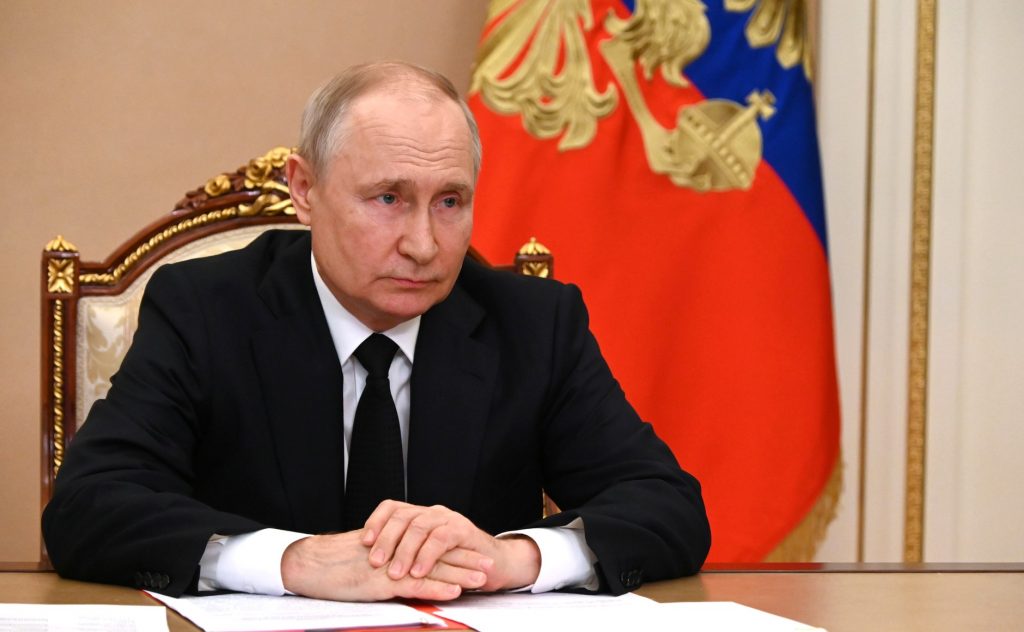
On Friday, July 21, Vladimir Putin held a regular meeting with the permanent members of the Security Council of the Russian Federation. The main topics for discussion were preparations for the Russia-Africa summit to be held in St. Petersburg at the end of July and the situation in Ukraine. Unlike most previous meetings, most of which take place in a closed format, this meeting began with a public statement by the head of the Foreign Intelligence Service, Sergei Naryshkin, about Poland’s alleged plans to occupy the western regions of Ukraine. In turn, Vladimir Putin commented on such information and also, in his usual manner, tried to bring historical parallels.
Key theses:
- Naryshkin: “According to information from several sources, official Warsaw is gradually coming to the realisation that no Western assistance to Kyiv is capable of supporting Ukraine for the purposes laid down in this assistance. Moreover, the realisation is coming that the issue of the defeat of Ukraine is only a matter of time.”
- Naryshkin: “In this regard, the Polish leadership is intensifying its mood to control the western territories of Ukraine, the western regions, by deploying its troops there. Such a step as one of the options is planned to be formalised as the fulfilment of allied obligations within the framework of the Polish-Lithuanian-Ukrainian initiative in the field of security – this is the so-called Lublin Triangle.”
- Putin: “Today, it is clear that the Western curators of the Kyiv regime are clearly disappointed with the results of the so-called counter-offensive, which the current Ukrainian authorities have loudly announced in previous months. There are no results, at least not yet.”
- Putin: “Yes, of course, Western weapons can be additionally supplied and thrown into battle. This, of course, causes us some damage and prolongs the conflict. But, firstly, NATO arsenals and stockpiles of old Soviet weapons in some states are already largely depleted. And secondly, the existing production capacities in the West do not allow you to quickly replenish the consumption of reserves of equipment and ammunition. Additionally, moreover, more resources and time are needed.”
- Putin: “People in Ukraine increasingly have a question, a legitimate question: for what, for the sake of whose selfish interests, their relatives and friends are dying? Gradually, slowly but sobering comes. We see that in Europe, public opinion is changing. Both Europeans and representatives of the European elites see that the so-called support for Ukraine is, in fact, a dead end, an endless waste of money and effort. Still, it is serving foreign far from European interests: the interests of the overseas global hegemon, which benefits from the weakening of Europe. It also benefits him from the endless prolongation of the Ukrainian conflict.”
- Putin: “However, the fire of war is being intensively kindled. In particular, they use for this the ambitions of the leaders of some Eastern European states, which have long turned hatred of Russia, and Russophobia into their main export product and into an instrument of their domestic policy. And now they want to warm their hands on the Ukrainian tragedy.”
- Putin: “After all, the prospect is obvious: if Polish units enter, for example, Lviv or other territories of Ukraine, they will remain there. And they will remain forever. And by the way, this is nothing new. Let me remind you that after the defeat of Germany and its allies due to the First World War, the Polish units occupied Lviv and the surrounding lands, which then belonged to Austria-Hungary. Poland, instigated by the West, took advantage of the tragedy of the Civil War in Russia and annexed some historical Russian provinces. Our country, which was then in a difficult situation, was forced to sign the Treaty of Riga in 1921 and, in fact, recognise the rejection of its territories. And even earlier, in 1920, Poland captured part of Lithuania – the Vilna region, the territory around modern Vilnius. It seems that together with the Lithuanians, they fought against the so-called “Russian imperialism”, and as soon as the opportunity turned up, they immediately chopped off a piece of land from their neighbours. Poland also took part, as is well known, in the partition of Czechoslovakia as a result of the Munich Pact with Hitler in 1938. They occupied Cieszyn Silesia completely.”
- Vladimir Putin: “I would also like to remind you of the outcome of such an aggressive policy for Poland. It ended in the national tragedy of 1939 when Poland was thrown by the Western allies to be devoured by the German military machine and actually lost its independence and statehood, which was restored to a large extent thanks to the Soviet Union. And it was precisely thanks to the Soviet Union, thanks to the position of Stalin, that Poland received significant lands in the West, the lands of Germany. This is exactly so: the western territories of present-day Poland are a gift from Stalin to the Poles. Have our friends in Warsaw forgotten about this? We will remind you.”
- Putin: “Today, we see that the regime in Kyiv is ready to do anything to save its venal skin and prolong its existence. They do not care about the people of Ukraine, its sovereignty and national interests. They will trade everything: both people and land. Just, by the way, like their ideological predecessors, the Petliurists, who in 1920 concluded with Poland the so-called secret conventions, according to which, in exchange for military support, they gave Poland the lands of Galicia and Western Volyn. Even today, such traitors are ready to open the gates for foreign masters and sell Ukraine again.”
- Putin: “As for Belarus, it is part of the Union State; unleashing aggression against Belarus will mean aggression against the Russian Federation. We will respond to this with all the means at our disposal. The Polish authorities, hatching their revanchist plans, do not tell the truth to their people either. And the truth is that the Ukrainian “cannon fodder” for the West is already clearly not enough. Therefore, they plan to use new consumables: the Poles themselves, Lithuanians, and further down the list – everyone who is not sorry. I will say one thing: this is a very dangerous game, and the authors of such plans should think about the consequences.”
Outcomes and outlook:
The anti-Polish rhetoric of Russia is understandable: in the eyes of the Russian layman, Poland creates, if not the main enemy of the Russian Federation, then at least such a “jackal of Europe”, which is a source of anti-Russian meanings and threatens all neighbouring states – primarily Belarus and Ukraine. In the understanding of Russia, Poland is a tool and a source of catholization and Westernization of Eastern European societies. From a historical point of view, the image of Poland as a historical enemy of Russia clearly fits into the concept of the new history of Russia: the Day of National Unity in Russia is the day of the expulsion of the Poles by Minin and Pozharsky, the main troubles in Russia in the 18th and 19th centuries are due to Polish intrigues and uprisings, the Bolshevik concept of the “world revolution” bogged down due to the defeat of the Red troops on the Vistula by the Poles. But Russia also proceeds from the medieval principle, “The enemy of my enemy is my friend.” That is why the narrative about the threat to Ukraine and Belarus from Poland is being planted. Ukrainians are told that the Poles will soon take away Galicia and Volhynia (which were part of the Second Commonwealth until September 1939), the Belarusians – that the Poles intend to overthrow Lukashenko and put Tikhanovskaya in the presidency (for this purpose, the Poles are allegedly preparing an invasion of Belarus as early as August 2023). Thus, Russia is playing to inflame the contradictions between Kyiv and Warsaw, Warsaw and Minsk.
At the same time, it is worth recognising Russia is getting involved in internal Polish political games. Oddly enough, it is beneficial for Russia to keep the Law and Justice Party (PIS) in power, despite its openly anti-Russian rhetoric. Staying PIS in power is not only a conflict with Russia (this is precisely Russia’s most minor concern). PIS continues and deepens Poland’s conflict with Old Europe, especially Germany. The victory of the liberals from the “Civil Coalition” is the renewal of Poland’s orientation towards Brussels and, possibly, the strengthening of relations with Washington (today, Warsaw is in the wake of British politics). The latest sociological data shows that in the event of parliamentary elections (scheduled for October 2023), PIS will receive 33.3% of the vote. The Civic Coalition led by Donald Tusk can claim 27.6% of the vote (30.1% in June). Third Way populists can count on 10.3% of the vote. Another 9.9% can get leftist forces. Thus, the situation in the Polish party layout remains uncertain. And the statements of Russian politicians with accusations against Poland, as well as the fear-mongering of the “Wagnerites” and a possible war, strengthen the positions of the PIS. Russia believes: all the same, anti-Russian forces will come to power in Poland, so let them work against Russia and the European Union.
- Alexander Lukashenko’s visit to Russia
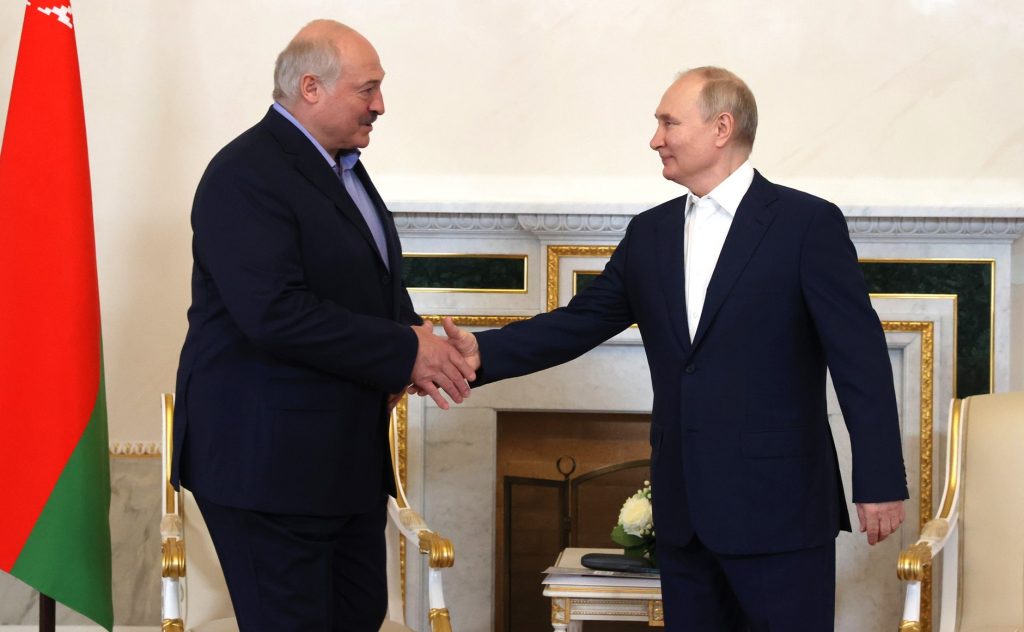
On Sunday, June 23, Alexander Lukashenko’s visit to Russia began. The official part of the meeting was held at the Konstantinovsky Palace in St. Petersburg. The leaders of Russia and Belarus arrived at it together. Also, many journalists noted that the meeting was held without ties, which allegedly indicated the disposition of the parties to a productive dialogue. During the public part of the talks, the parties discussed the economic situation in Russia and Belarus and also touched upon the topic of Ukraine. In that number, accusations were again voiced against Poland, which allegedly plans to occupy the western part of Ukraine. During the conversation, Lukashenko noted that he intended to stay in Russia for one more day. In response, Putin said that he had already changed his plans to communicate more effectively with the Belarusian leader.
After the official part of the meeting, Putin and Lukashenko visited the Museum of Naval Glory in Kronstadt and the St. Nicholas Naval Cathedral, after which they talked with those gathered on the square near the temple.
Key theses:
- Vladimir Putin: “I want to document the good state of the economy of Russia and Belarus. I looked at the latest data: for the year in Belarus, economic growth is expected – 3.7 per cent. This is a predictive value, but nonetheless. I can say we are a little lower, but this is also a good indicator for us: we are counting on more than two per cent growth. Your deficit is minimal – 0.4 per cent. This is also very good. International reserves are at a decent, excellent level. Unemployment is low. In general, all the main indicators give us reason to believe that this year, in any case, we will pass confidently, calmly and demonstrate good growth rates.”
- Putin: “We are fully and completely implementing all the plans for the construction of the Union State. We are moving confidently in these directions.”
- Putin: “The nuclear power plant [in Belarus] has already generated, in my opinion, 17 [thousand gigawatt-hours]. The second unit will be launched this year.”
- Lukashenko: “I want to start with the work of the Armed Forces of Ukraine. Yesterday was not easy; according to our data, you will also express your opinion later. It was a challenging day. Luckily it ended well. According to our data, I recorded over 15 Leopards destroyed and over 20 Bradleys in one battle. I believe this had never happened before foreign [types of military equipment] were destroyed.”
- Lukashenko: “Therefore, one can estimate how many soldiers died, unfortunately, from the side of the Armed Forces of Ukraine, when so much equipment was destroyed. I know this because I had to serve as an officer in armoured vehicles at one time. I understand what it means to destroy so many infantry fighting vehicles and, most importantly, these vaunted Leopards.”
- Lukashenko: “According to the estimates of the United States of America, since the beginning of the counter-terrorist operation, the losses of the Armed Forces of Ukraine irrevocably, or as they are called, [amounted] to 26 thousand [persons].”
- Lukashenko: “Yesterday shows – why I say this – that the war has to be waged against the entire NATO bloc. Many armaments – they, mercenaries- have already been connected, which is why yesterday is essential; the main strategic reserves are being linked. This suggests that this thoughtless policy of throwing unprepared people and mercenaries into hell will not lead to anything.”
- Lukashenko: “I specially brought you a map about the transfer of Poland’s armed forces to the Union State’s borders, which you spoke about. We see the ground being prepared. Suppose one of the brigades found its place 40 kilometres from Brest. We stood at 500 kilometres, transferred to 40 kilometres. I’ll show you the map, we can see it all. And a little more than 100 kilometres from Grodno – the second brigade is being transferred. They have a division, but so far, the troops have approached.”
- Lukashenko: “Tear off this piece of western Ukraine: under the guise of joining NATO, so that the population can enter, they want to chop off Western Ukraine and annex it to Poland. This is the payment for the active participation of the Poles in this operation against, of course, the troops of the Russian Federation. The Americans support it. I already told you a long time ago, but we saw this six months ago and discussed it beforehand.”
- Lukashenko: “The separation of Western Ukraine, the dismemberment of Ukraine and the transfer of land to Poland is unacceptable. And if the Western population of Ukraine needs it, we will, of course, support them.”
- Lukashenko: “Maybe we shouldn’t have said it, but I will say that the Wagnerites began to strain us. Asking for the West: Let us! I say: Why do you need to go west, there? Well, quietly [they say] – we control what happens: we go on an excursion to Warsaw and Rzeszow. And Rzeszow is unacceptable to them. They fought near Artyomovsk [Bakhmut], and they know where the military equipment came from, and they have this inside: Rzeszow is a disaster.”
Outcomes and outlook:
Alexander Lukashenko’s visits to Russia have become a monthly ritual, and negotiations to complete the creation of the Union State are in full swing. Lukashenko is gradually being returned to Russian politics. In fact, the end of Putin’s second term is about creating a new “tandem” – modelled on the “tandem” of 2007-2008 (Putin and Medvedev).
Apparently, by the end of 2023, the completion of the unification of Russia and Belarus into a single-state association (confederation) headed by Alexander Lukashenko will be announced. Putin allegedly will go to secondary roles, although he will retain all the levers of control. Lukashenko is the only one who, having become (formally) the head of state, will not break the existing systemic ties and will not lead to the strengthening or weakening of one or another group. That is, “clan parity” will be observed.
Today’s statements about Poland’s attempts to attack Belarus are nothing more than a pretext for strengthening Russia’s military presence on the territory of Belarus. We should most likely expect the transfer of new troops and weapons from the Russian Federation (currently, Russia is present in Belarus only to a point). It is also possible to predict personnel changes in the power structures in Belarus (especially in law enforcement agencies) soon – in favour of pro-Russian groups of influence.
It should be noted that the meeting between Lukashenko and Putin took place on the eve of the Russia-Africa summit, which will also be held in St. Petersburg. In Africa, Belarus has a reasonably strong position, given Lukashenko’s recent meetings with the leaders of Zimbabwe and Equatorial Guinea. It is expected that part of the “Wagnerites” located on the territory of Belarus will be sent to Africa shortly. This could also become the subject of additional negotiations between Putin and Lukashenko and the issues of military supplies of chips and other high-tech elements for Russian military equipment through the mediation of Belarus and African states.
- Death of Anton Cherepennikov
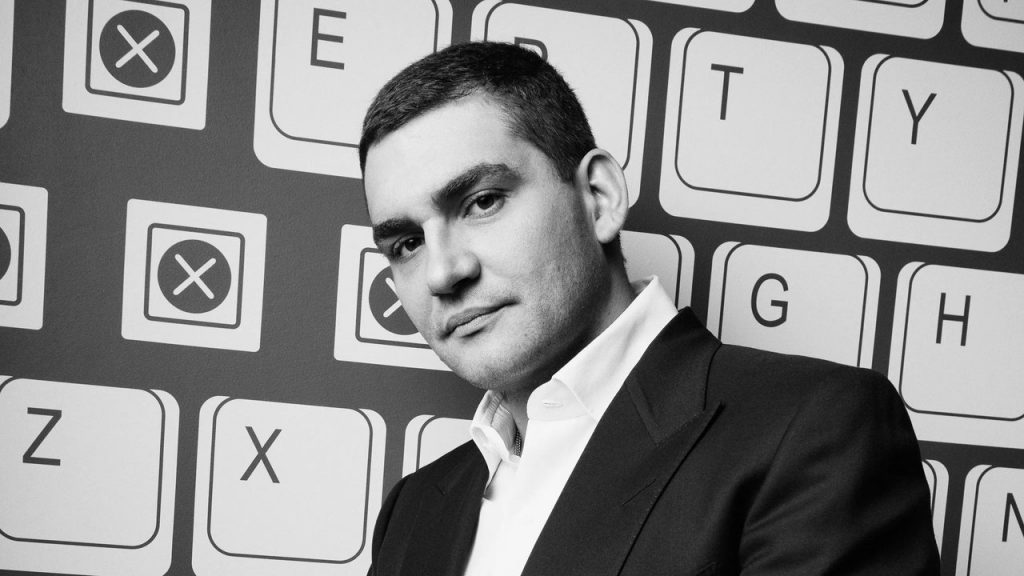
On Saturday, July 22, Anton Cherepennikov, a Russian businessman and CEO of the largest IT company ICS Holding, died at the age of 40. The tentative cause of death is said to be cardiac arrest. Also, information is spreading on the network that Cherepennikov’s heart stopped during the xenon therapy procedure – introducing the patient into sleep under medical xenon.
Anton Cherepennikov was among Russia’s top most successful young entrepreneurs over the years. At the end of February 2023, Cherepennikov was included in the US SDN and Ukraine sanctions list. Cherepennikov’s companies (“IKS Holding”) are Russia’s largest listening equipment manufacturers and suppliers.
Outcomes and outlook:
The death of Anton Cherepennikov may partially be linked to internal disputes in Russian law enforcement agencies. Cherepennikov was not just a manufacturer and supplier of eavesdropping equipment and software for the FSB and the intelligence community of the Russian Federation. He actually controlled groups of gamers (including in Ukraine) and hackers. Cherepennikov is a kind of “king of the virtual world” of Russia.
In his activities, he was closely tied to the first deputy director of the FSB of Russia, Sergei Korolev, who did not hide his desire to take Alexander Bortnikov to the nearest place. A few years ago, the media wrote that it was Cherepennikov who gave Korolev’s son an apartment in a prestigious district of Moscow and also that Cherepennikov won the tender for the production of special technical equipment for the FSB thanks to his acquaintance with Korolev.
Cherepennikov’s death came when Korolev was on the US and UK sanctions lists and the day before Korolev’s birthday (July 25, he turns 61). It’s also quite symbolic. Thus, we can talk about the intensification of the struggle within the FSB and the law enforcement agencies of Russia for new appointments and for influence on the decision-making process.
- Termination of the Black Sea Grain Initiative
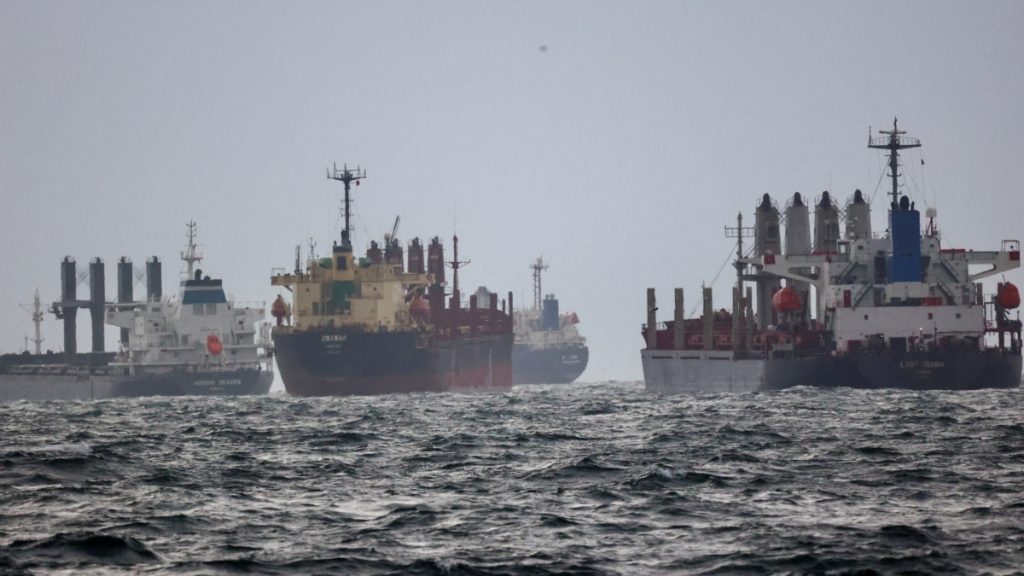
On Monday, July 17, the deadline for the subsequent continuation of the Black Sea Grain Initiative, which was the only option for grain exports from Ukraine agreed upon by Ukraine, Turkey, the UN and Russia, officially expired. A week before the “grain deal” ended, the latter announced that it would not go for another continuation until all the conditions were met. On the night of July 16-17, the Kerch Bridge was subjected to another attack, resulting in one of the spans being damaged. This event was decisive for the Kremlin and served as the final exit from the grain export agreement. At the same time, throughout the week, Kyiv and several Western states were actively discussing the possible launch of alternative options, which have not yet been agreed upon by all parties.
Timeline:
- On Monday, July 17, the Chinese Foreign Ministry said that they hope to extend the Black Sea Grain Initiative: “We are ready to strengthen cooperation with all parties in this area, contribute to the formation of a greater international consensus, and make a positive contribution to global food security.”
- Putin’s spokesman Dmitry Peskov officially announced the termination of the “grain deal”: “Russia will immediately return to the” grain deal “as soon as the agreements concerning it are implemented.”
- Later, the official speaker of the Russian Foreign Ministry, Maria Zakharova, confirmed that the Russian side had notified other participants in the Black Sea Grain Initiative about its suspension: “Russia today officially notified Turkey and Ukraine, the UN Secretariat of its objection to the extension of the grain deal.”
- After Russia announced its withdrawal from the Black Sea Grain Initiative, wheat futures in Chicago rose by 4.2%.
- Recep Tayyip Erdogan said that the Black Sea Grain Deal has gone down in history. At the same time, he intends to discuss its resumption with Vladimir Putin.
- The Russian side announced that it was withdrawing guarantees for the safety of navigation in the northwestern Black Sea due to the completion of the grain deal. The joint coordination centre in Istanbul was also disbanded.
- Volodymyr Zelenskyy said that Ukraine is in favour of continuing shipping even after Russia withdraws from the agreement: “We were approached by companies that own ships. They said they were ready to continue transporting grain if Ukraine was ready to let go and Turkey was ready to let through.”
- The UN representative in Istanbul confirmed the receipt of a letter from the Russian Federation on the termination of the “grain deal”: “The Secretary-General will not stop his efforts to promote unhindered access to global markets for food products and fertilisers from both Ukraine and the Russian Federation to maintain global food security.” He also noted that UN Secretary-General António Guterres sent a letter to Vladimir Putin with a new proposal to maintain the “grain agreement”. In particular, the letter says that since the signing of the agreement between the UN, Turkey and Russia, “Russian exports are approaching a full recovery.”
- US Secretary of State Anthony Blinken said the US is pushing for the grain deal to be extended as soon as possible. At the same time, according to him, the West and Kyiv will consider options for exporting food from Ukraine to world markets in connection with the withdrawal of the Russian Federation from the grain deal.
- Volodymyr Zelenskyy reported on a telephone conversation with UN Secretary-General Antonio Guterres, during which the “grain deal” was discussed: “The Black Sea Grain Initiative must be maintained. We agreed with Mr Guterres to work with the responsible states to restore food security and supply along the Black Sea routes.”
- On the night of July 18, Russian missiles and UAVs attacked Odessa, as a result of which the port infrastructure in the city and the region was damaged. The port in Mykolaiv was also attacked.
- On Tuesday, July 18, US Security Council coordinator John Kirby said that the US would not send warships to escort commercial vessels from Ukraine after the grain deal was broken: “The only option available is to transport by land, by rail, by truck.” “It’s more difficult, less effective.”
- USAID chief Samantha Power said the United States will provide Ukraine with $250 million to support agriculture after Russia withdraws from the grain deal: “We have a collective interest in keeping Ukrainian farmers in business.”
- On the night of July 19, the port infrastructure in Odessa and the region was attacked again. According to official statements by local authorities, Oniksy and Kh-22 missiles hit grain and oil terminals, tanks and loading equipment were damaged.
- Ukrainian Ambassador to Turkey Vasily Bodnar said that Ukraine is considering the possibility of launching a new “grain corridor” without the participation of the Russian Federation – through the territorial waters of Romania and Bulgaria. Apparently, the diplomat meant the transportation of grain across the Danube.
- On Wednesday, July 19, BILD military analyst Julian Röpke said that Russia is imposing a naval blockade of Ukraine with night strikes on the Odesa ports: “With its nightly bombardments of the Odesa port, Russia actually imposed a naval blockade of Ukraine immediately after the end of the grain deal on Monday. 12 cargo ships were stuck in the Ukrainian ports of Odesa and Mykolaiv. Not a single dry cargo ship has entered Ukraine since the beginning of the Russian bombing.”
- The Ministry of Defense of the Russian Federation announced that from July 20, all ships sailing in the Black Sea to Ukrainian ports will be considered by it as potential carriers of military cargo. The statement said that the flag countries of such ships would be considered by Moscow as involved in the war on the side of Ukraine. The Ministry of Defense of the Russian Federation has declared several sea areas in the northwestern and southeastern parts of the international waters of the Black Sea temporarily dangerous for navigation.
- On Thursday, July 20, the Ministry of Defense of Ukraine announced that they would consider ships moving along the Black Sea to Russian ports as carrying military cargo: “The Ministry of Defense of Ukraine warns that from 00:00 on July 21, 2023, all ships moving in the Black Sea in the direction of seaports of the Russian Federation and Ukrainian seaports located on the territory of Ukraine temporarily occupied by Russia can be considered by Ukraine as carrying military goods with all relevant risks.”
- Vladimir Putin said that Russia would consider returning to the grain deal “if all the principles of its participation in it are taken into account and implemented without exception.”
- Ukraine, in a letter to the International Maritime Organization, said that it had created a mechanism to provide “guarantees for damages” to companies and ships visiting Ukrainian ports after the completion of the grain deal. According to the letter, Ukraine states that this mechanism will work for vessels in Ukrainian territorial waters or heading to/from Ukrainian ports.
- US National Security Council spokesman Adam Hodge said Russia could attack civilian ships in the Black Sea and blame Ukraine for it; the White House said: “We believe this is a coordinated effort to justify any attacks on civilian ships in the Black Sea and blame these attacks on Ukraine.”
- German Foreign Minister Annalena Burbock said that 32 million tons of grain were “stuck” in Ukraine after the Russian Federation withdrew from the “grain deal” 2 and began a naval blockade.
- On Friday, July 21, Recep Tayyip Erdogan said that Russia is “in favour of the active work of the grain corridor” and that Western countries “should take measures to restart it.”
- US Secretary of State Anthony Blinken said the US and its allies are looking for alternatives to the grain deal but do not believe it can replace lost supplies via other routes.
- Recep Tayyip Erdogan and Vladimir Zelensky held a telephone conversation during which they discussed the resumption of the “grain deal”. The message of the Turkish side says that the Turkish leader does not yet believe that the “grain deal” reached through his mediation is buried completely.
- On Saturday, July 22, Volodymyr Zelenskyy had a telephone conversation with NATO Secretary General Jens Stoltenberg, during which the parties discussed the situation in the Black Sea and the unblocking of grain exports from Ukraine.
- Already on Sunday, July 23, Volodymyr Zelensky announced that he was convening a meeting of the Ukraine-NATO Council, which was created at the Alliance summit in July: “I turned to Jens ( Stoltenberg ) with a proposal to urgently convene such a Council for appropriate crisis consultations. The meeting will take place in a few days. We can overcome the security crisis in the Black Sea.”
Outcomes and outlook:
The fact that Russia would withdraw from the “grain agreement” was obvious: the Ukrainian leadership had information that the deal would not be extended until at least July 14. The strikes on the Kerch Bridge did not cause Russia to refuse the deal. Russia has decided to pursue its own independent policy in the grain markets. It will announce it in the coming days, as expected, at the Russia-Africa summit.
In essence, this is an attempt by Russia to create some alternative to the Chicago Grain Exchange with the desire to independently set market prices for grain for the countries of the Global South. Putin’s promises of fairer grain prices for Africa and free grain for most needy countries are an open challenge to the Chicago Stock Exchange. Russian missile strikes on the port infrastructure of Ukraine (Odesa, Mykolaiv, Ochakov, etc.) are an attempt to destroy grain transshipments on the Black Sea and remove Ukraine from the ranks of grain exporters – at least for the coming years. The old idea of Russia (Grain OPEC) may become one of the proposals for Ukrainian grain traders for the period after the end of the war.
- Detention of Igor Girkin-Strelkov and Pavel Gubarev
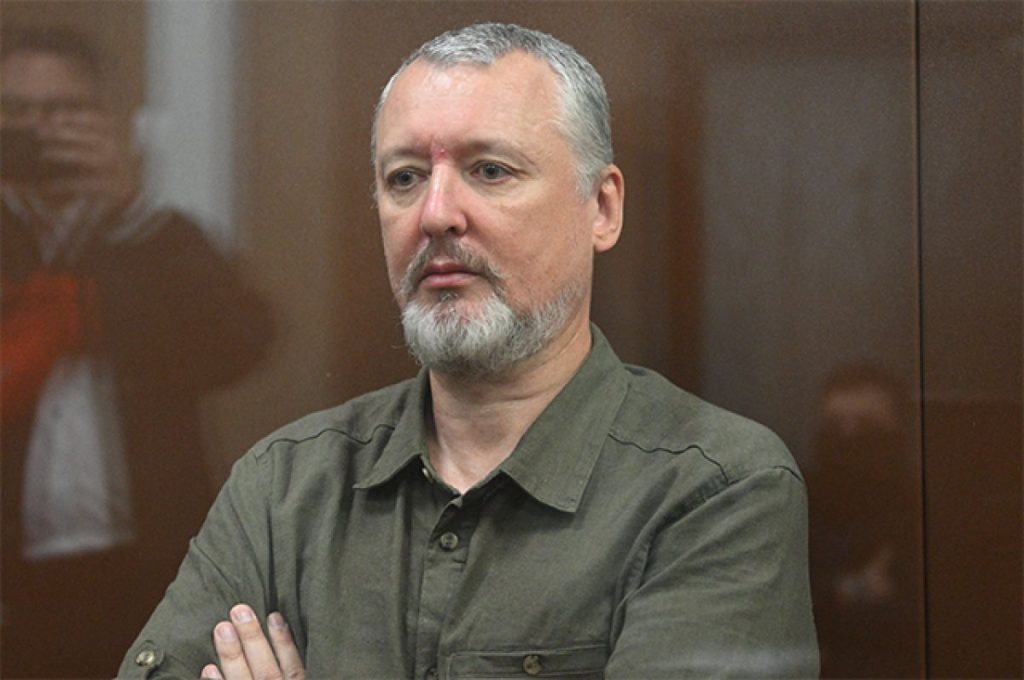
On Friday, July 21, the former Defense Minister of the self-proclaimed “DPR”, politician and blogger Igor Girkin-Strelkov, was detained in Moscow. He was charged under Article 282 of the Criminal Code of the Russian Federation (extremism). It is worth noting that on the eve of Strelkov, in his Telegram channel, he turned to harsh criticism of Putin personally. A few hours later, during a small rally in support of Girkin -Strelkov was detained by his colleague – Pavel Gubarev (political figure and collaborator). Later, Gubarev was released, and the fate of Girkin was unknown until Sunday evening when information appeared that he was being held at Lefortovo.
Timeline:
- Strelkov’s lawyer confirmed his detention and said he was being charged with extremism.
- Dmitry Petrovsky, a former deputy from Yaroslavl and a member of the Wagner PMC, confirmed to the Russian media that he wrote a statement against Girkin -Strelkov, which was the reason for his detention. Petrovsky said that he did this because of Girkin’s “collusion” with Putin: “I turned to the RF GP in order to verify his statements about the real FSB colonel, our president. And also with a request to check his real service career and tangible achievements.
- Investigators asked the court to take Girkin into custody. He was charged under the article on public calls to carry out extremist activities (Article 280 part 2).
- Girkin-Strelkov asked to be released under house arrest, referring to his state of health: “Recently, I was diagnosed with angina pectoris of the second degree; I did not have time to get certificates. I take the necessary medications daily. I would like to undergo a measure of restraint as house arrest.”
- Girkin-Strelkov’s lawyer, said that he was charged with extremism for two posts in the telegram channel on May 25 about Crimea and that servicemen of the 105th and 107th airborne regiments were not paid.
- The court sent Girkin-Strelkov to prison for two months until September 18 on extremism charges.
- Alexei Melnikov, Secretary of the Public Monitoring Commission of the Russian Federation for the Protection of Human Rights in Places of Detention, said that the arrested Igor Girkin is being held in the Lefortovo pre-trial detention centre in Moscow. According to him, Girkin is in a double cell.
Outcomes and outlook:
Closed sociological data leaked to the media show that on the eve of the presidential elections, the main danger for Putin is not the so-called “pro-Western” opposition, whose volume is estimated at 5% and the growth ceiling is 12%, but “offended patriots”, who currently about 8-12%, and their number could grow to 20%.
Putin decided to put things in order with the “offended” by arranging a public flogging of Igor Girkin (the most active representative of this social group), as well as detaining Pavel Gubarev, one of the symbols of the separatist movement in Donbas. Today, the “offended” are actively supported by the oligarch Konstantin Malofeev and the former assistant to the President of the Russian Federation, Vladislav Surkov. Interestingly, an angry post that Putin outlawed himself by arresting Girkin was published by one of the active figures in the Ukrainian emigration, Oleg Tsarev. However, it may also turn out that the authorities are thus preparing a replacement for Putin’s sparring partner. After the “Prigozhin rebellion”, Yevgeny Prigozhin is unlikely to be able to take an active part in political activities.
That is why the young, active, with the image of an oppositionist, but absolutely controlled by the authorities, Igor Girkin enters the stage and becomes a real problem for the Western world, as the face of someone who can come to power in Russia instead of Putin will be shown.
In terms of reforming the Russian system of government and the creation of the Union State, this does not mean anything – Putin will still remain in power, even if Lukashenka becomes the formal head of the confederation and Natalia Kochanova and Igor Girkin head the entities (which is unlikely). But the message for the West will be pretty obvious, making them seriously nervous.
- Muslim protest in Moscow
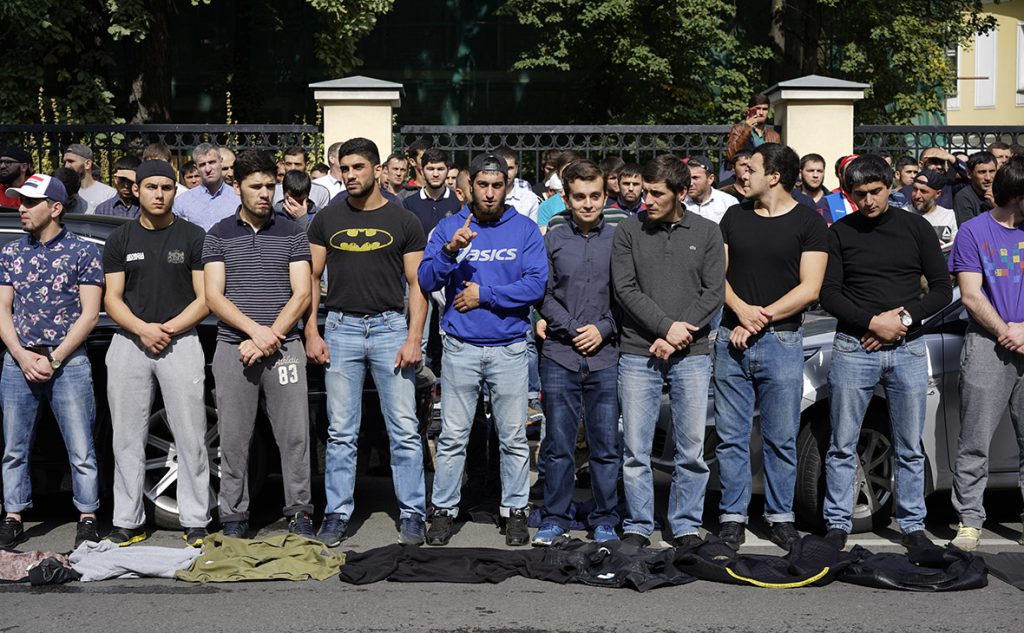
On Friday, July 21, an unsanctioned rally of Muslims took place in Moscow, who opposed the security forces. They marched through the city’s central streets in protest against the actions of representatives of law enforcement agencies, who broke into a prayer house in Kotelniki (Moscow region) in early July. This situation caused great resonance immediately after the video’s publication with the security forces’ actions. At the same time, the rally itself took place only a few weeks later.
Timeline:
- On Friday, July 7, a video filmed in a prayer house located in a high-rise building on Dzerzhinsky Highway appeared on social networks. It shows that a particular gas was sprayed into the room. There are no people in police uniforms in the footage.
- Later, another video was published, in which people in the form of OMON walk around the premises of the prayer house. “The police officer is doing his job,” one of them says in response to the claims of the gathered people.
- On Saturday, July 8, representatives of the Muslim community in the Moscow region recorded a video message to President Vladimir Putin asking him to sort out the conflict. According to them, the security forces “without taking off their street shoes, burst into the room where people pray, showing disrespect for those praying, using physical force with shouts and obscene expressions,” and in response to a demand to explain their actions, “sprayed a fire extinguisher towards the parishioners.”
- Delimkhanov to deal with the issue of a raid in a prayer house in Kotelniki near Moscow.
Outcomes and outlook:
Relations between the Russian authorities and Muslim communities, especially in the capital, are becoming a big problem because they arise pretty often. To date, according to some reports, the followers of Islam are about 40% of the population of Moscow. The difference in ethnocultural, religious aspects, social issues, and so on often lead to clashes and are a breeding ground for xenophobic manifestations and the development of nationalist tendencies.
According to some experts, Russia will face severe inter-ethnic conflicts in the cities of the European part by 2030-2033. But such cases can be called harbingers of a big problem, which Russia is frankly not ready to solve. Today, Russia is in the state where the United States was in the early 90s, and France – is in the “zero”. As a result, Russia will receive its BLM-type movements in a relatively short time or the recent unrest of the coloured population in France.
- Transfer of Danone facilities to Ramzan Kadyrov’s group
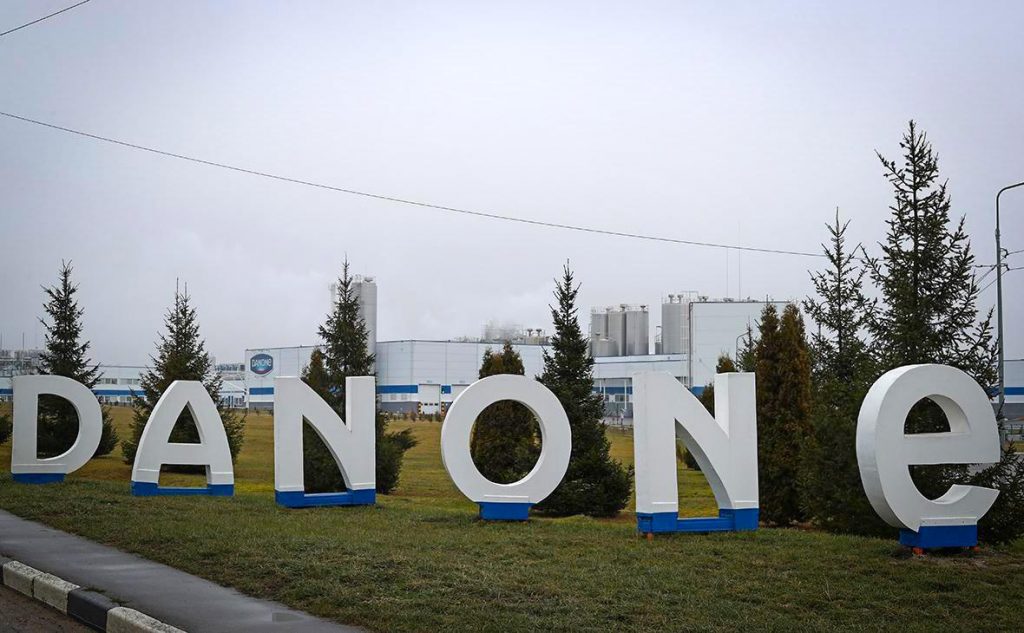
On Wednesday, July 19, Deputy Prime Minister and Minister of Agriculture of Chechnya Yakub Zakriev was appointed as the CEO of Danone Russia, one of Russia’s largest producers of dairy products (earlier, the company was transferred under the control of the Federal Property Management Agency). At the same time, Putin’s decree on temporarily transferring Russian business to the French company Danone and Russian assets to the Danish company Carlsberg (Baltika brewery) was signed on July 18. At the same time, it is reported that Baltika was headed by 70-year-old Taimuraz Bolloev, who already served as company president during 1991-2004.
Outcomes and outlook:
Putin indicates to the West that he is not joking and that if the return of Western firms that left Russia occurs, it will only be “from scratch”. The transfer of Danone’s capacities to Kadyrov’s people is an indicative prize and a payment for vassal service. And simultaneously – a signal to the West: “So it will be with everyone.”
Notably, the demonstrative transfer concerns precisely one of the most significant assets of the French business. Against the backdrop of events in Mali, where Paris ceded influence to Moscow, as well as the transfer of French-British SCALP missiles to Ukraine, it can be assumed that such actions by Russia are yet another demonstration of the deterioration of relations with Paris.
- Vladimir Putin’s article about Africa
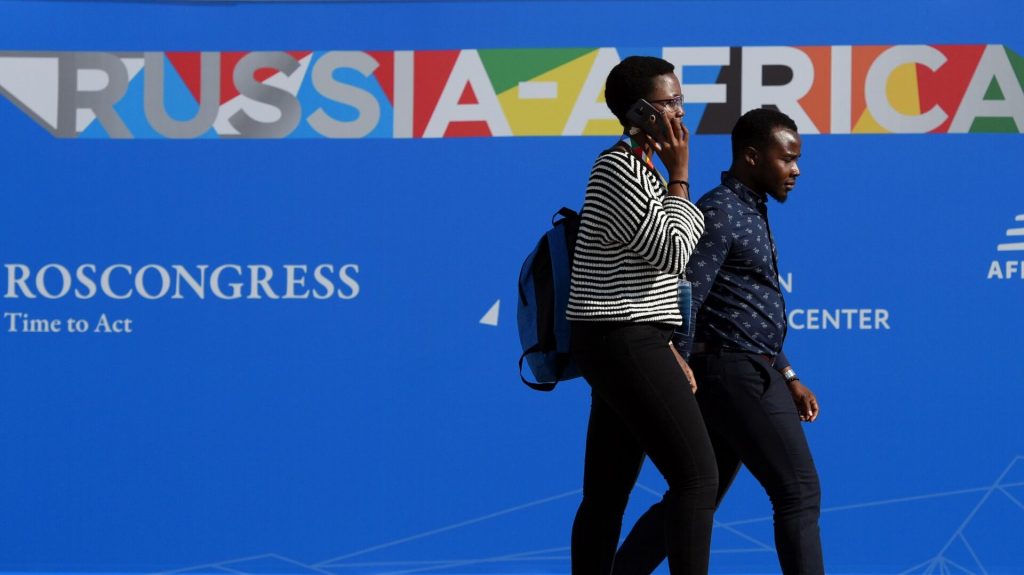
On Sunday, July 23, Vladimir Putin’s article “Russia and Africa: Joining Efforts for Peace, Progress and a Successful Future” was published on the website of the presidential administration of the Russian Federation. It outlines the position of the Russian president on the eve of the Russia-Africa summit, which will be held July 27-28 in St. Petersburg. Notably, despite Putin’s focus on relations between Moscow and the African continent, he did not bypass the topic of Ukraine in his article.
Key theses:
- “The partnership relations of our country with Africa have solid and deep roots and have always been characterised by stability, trust and goodwill. We consistently supported the African peoples in their struggle for liberation from colonial oppression, assisted in forming statehood, and strengthened sovereignty and defence capability.”
- “We have always strictly adhered to the principle of “African problems – an African solution” and stood in solidarity with Africans in their struggle for self-determination, justice and upholding their legitimate rights. We have never tried to impose our ideas about the internal structure, forms and methods of management, development goals and ways to achieve them on partners.”
- “Today, the constructive, trusting, forward-looking partnership between Russia and Africa is especially significant and important. Powerful economic and political centres of power and influence are being formed in the world, asserting themselves more and more insistently, demanding that they be reckoned with. We are confident that the new, multipolar world order, the contours of which have already been outlined, will be more just and democratic.”
- “We always support the constructive initiatives of our partners; we stand for giving African countries a worthy place in the structures that determine the fate of the world, including the UN Security Council and the G20, for reforming global financial and trade institutions in their interests.”
- “Unfortunately, we see that the current situation in the world is far from stable. Long-standing conflicts that exist in almost every region are deepening, and new threats and challenges are emerging. And Africa, like no other part of the world, is feeling the burden of global problems.”
- “Many have probably heard about the so-called “grain deal”, originally aimed at ensuring global food security, reducing the threat of hunger and helping the poorest countries in Africa, Asia and Latin America – in fact, this is why Russia has committed itself to assist its implementation. However, this “deal”, which was publicly presented in the West as a manifestation of their concern and benefit for Africa, was shamelessly used solely to enrich large American and European businesses that exported and resold grain from Ukraine.”
- “Despite the sanctions, Russia will continue to vigorously work on organising the supply of grain, food, fertilisers and more to Africa: we highly appreciate and continue to dynamically develop the entire palette of economic ties with Africa – with individual states, and with regional integration associations, and, of course, with the African Union.”
- “Continuing the established traditions, we plan to provide assistance in training national personnel for African states. Today, about 35,000 students from the continent study in our country, of which more than 6,000 are funded by Russian scholarships. Every year we increase the number of scholarships provided, stimulate education on a commercial basis and have recently become widespread inter-university ties.”
- “It is in our common interests to bring cooperation in the humanitarian sphere, in the field of culture, sports, and the media to a new, higher level. Taking this opportunity, I would like to invite our young African friends in March 2024 to come to Russia, to Sochi, to the World Youth Festival.”
Outcomes and outlook:
Putin’s article is quite essential, as it is a kind of manifesto for Russia’s new African policy. The intensification of Russia’s presence on the African continent was predicted earlier ( Ascolta wrote about this in several analytical materials ) – especially against the background of several tours of the Minister of Foreign Affairs of the Russian Federation Sergey Lavrov to African countries.
In the “Global South” crystallisation, Russia’s activity on the African continent is understandable. However, the interests of several other players will inevitably clash here – particularly China and France. China has taken control of up to 70% of the territory of Africa. The position of South Africa regarding the undesirability of the presence of the Russian leader at the BRICS summit is dictated not so much by fears because of obligations to the International Criminal Court but because of China’s unwillingness to share the black continent with other competitors. China will do everything possible to curb Russia’s desire to gain a foothold in Africa.
At the same time, Russia will be sent to territories that remain under the control of France or the United States. This, from Beijing’s point of view, is quite profitable. That is why soon, it will be possible to transfer a large number of “Wagnerites” and representatives of other PMCs to Africa – to promote the political interests of Russia.
One can predict that Africa will again become a territory of conflicts, wars and upheavals, especially for countries still oriented towards the West in their foreign policy.

